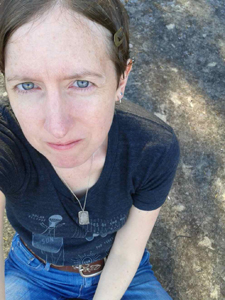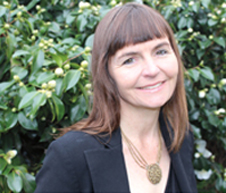On Vigilance and Lyric Adequacy:
Sara Cassidy in Conversation
with Kim Trainor

Local writer Sara Cassidy talks with Vancouver poet Kim Trainor, a previous winner of the Malahat's Long Poem Prize in 2013. Cassidy and Trainor discuss Trainor's work and her role as panelist for Investigative Poet: Observer, Researcher, Analyst, one of three interactive panel discussions at this year's literary symposium, WordsThaw.
This panel will take place Saturday, March 19, 1:30 p.m. - 3:30 p.m. at the University of Victoria.
Karyotype, your first book of poems, is filled with scientific observations of the natural world. You look so closely at things, finding the apt—accurate, expressive—words to describe them. When does poetry become a part of your observing?
Thank you for your kind words! I would be wary of calling the observation that you perceive in Karyotype "scientific" as I'm not a scientist, although I think poets are by nature observers. And I'm certainly preoccupied by certain scientific fields, such as the human genome, and archaeogenetics, as well as in the kinds of metaphors that are used to present genetic texts. But I approach these as a poet and layperson.
Do you want to first know, or first write, a poem? How are knowledge and creativity ordered in your writing process?
I think that poetry is a form of knowledge, that knowledge must be embodied, so there is no question of priorities—the two are inextricable. They come hand in hand.
You write, in reference to Polish poet Krzysztof Kamil Baczynski, that “A poem is a lens to focus sunlight. (Blackened ribs.)” Is it possible for a poem to look too intensely?
I don't think so. That line comes from "The semantic fields of glass and other transparent materials in the poetry of Krzysztof Kamil Baczyński." I was thinking of how poems can be lenses—they can focus attention, through selection, magnification, juxtaposition, reframing. I don't think a poem can look too intensely—but perhaps it comes down to the skill of the poet in rendering what is seen, what Seamus Heaney calls "adequacy." He uses the term in two ways. There is "documentary adequacy", for example, some small but telling detail in a poem, such as an epic simile in Homer where Odysseus's tears are likened to those of a Trojan woman who feels spears prodding her back as she mourns over her husband's body. He says this "documentary adequacy" "answers all that we know about the intolerable." But then he also refers to a lyric adequacy (although he doesn't use this term)—not factual or documentary adequacy, but the "ring of truth within the medium itself" and "a note tuned to its most extreme." There's a kind of truthfulness in the music of the poem, where I would argue music is the ally of emotional response, and perhaps also in its other formal properties, the ways in which what is seen is framed and ordered by the poet. This is crucial.
Two of the poems in Karyotype describe scenes observed in the television’s « blue cave ». In one poem, the speaker even cups her hands to the television screen to see the details better. Is the television, then, a fair mediator of the world?
The television is a mediator of the world, fair or not, as are other screens—our cell phones, iPads, computer screens. We have become virtual observers or witnesses with the advent of almost simultaneous transmission of world events into the palm of our hand. The poem where the speaker cups her hands to peer into the television screen is called "'In the long hours of darkness, Baghdad shakes to the constant low rumble of B-52s.'" It describes a historical moment from two perspectives: first, that of a journalist, Robert Fisk, who documented his experience of being in his hotel room one night in Baghdad, listening to and feeling American B-52s flying overhead; and second, the same moment, observed halfway around the world on a different continent, in the safety of Montreal. I followed the invasion of Iraq closely at the time, online, and on live television—the CBC, Al-Jazeera, live broadcasts from American reporters embedded with the US troops—'reality' TV. I was trying to speak to that weird distancing effect where war, for most North Americans, is almost always somewhere else, and becomes spectacle.
You’ve worked for the Department of Fisheries and Oceans and for a biomedical library. What did your work in those environments teach you about inquiry and observation?
This question makes me laugh a little. I was an office temp at the DFO so I learned a lot about bureaucracy and Byzantine filing systems. At Woodward biomedical library I was a library assistant for several years in the circulation department. Many interesting, sometimes old, books on biological topics passed through my hands and I'd often dip into them. I was also the assistant for discards, so had the somewhat traumatic experience of removing old books from circulation and discarding them. Some I rescued and took home with me, like an old encyclopaedia of the occult, and a book charting developmental stages through children's drawings. The main species I observed in those years was human. Libraries are refuges for searchers and lost souls.
Many of your poems are inspired by reading. Would it be fair to say that you read with an observational eye, that you study text as much as you study the world—nature, your children—around you?
Well, if I have any formal training it is in close reading of texts, as I have a PhD in literature. Close reading is a form of observation and attention. I love books. They're my species.
Can there be a poem without research?
Yes, for sure. But it depends how we define research. If I define research as time in the archives, meaning searching out forgotten papers, textual documents, ephemera, then many poems come to life without such research. If I define the archive differently, as memory, as clusters of human artefacts, as personal geographies, then perhaps most poems draw on research. Poetry might then be taken as a kind of vigilance—a broadband attention to the world and to these varied archives.
How are you feeling about taking part in the WordsThaw panel "The Investigative Poet: Observer, Researcher, Analyst"?
Anita Lahey, the moderator for this panel, kindly invited me and Rob Winger to participate in a similar panel last year, organized through Tightrope Books and their Best Canadian Poetry in English 2014 anthology. Speaking of screens and digital mediation, it was held in Toronto, and as I was in Vancouver, I participated via Skype. I think they may have placed me on a bookshelf during the discussion. Not a bad place to be. I'm really looking forward to having this second opportunity to talk about these ideas with Anita, Arleen Paré, and Kyeren Regehr—this time in the flesh.

Sara Cassidy
* * * * * * * *









